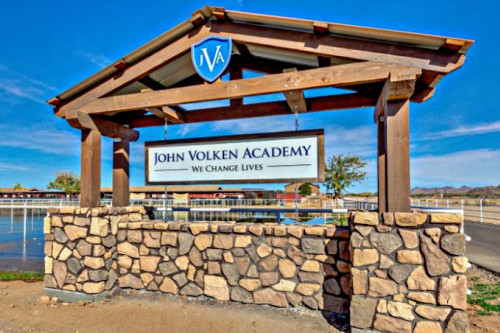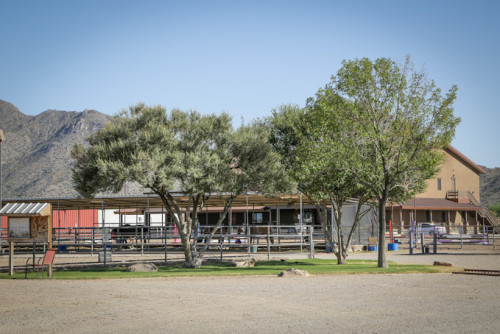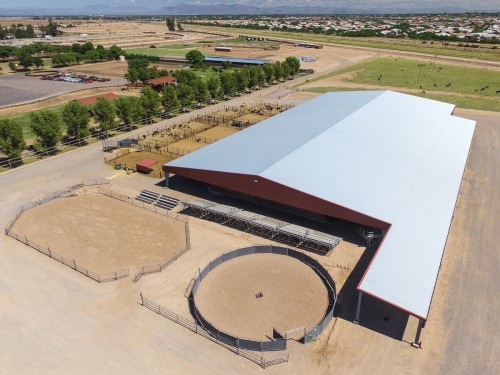






John Volken Academy Ranch
Treatment Focus
This center treats substance use disorders and co-occurring mental health conditions. Your treatment plan addresses each condition at once with personalized, compassionate care for comprehensive healing.
Primary Level of Care
Offering intensive care with 24/7 monitoring, residential treatment is typically 30 days and can cover multiple levels of care. Length can range from 14 to 90 days typically.
This provider hasn't verified their profile's information. Are you the owner of this center? Claim your listing to better manage your presence on Recovery.com.
Treatment Focus
This center treats substance use disorders and co-occurring mental health conditions. Your treatment plan addresses each condition at once with personalized, compassionate care for comprehensive healing.
Primary Level of Care
Offering intensive care with 24/7 monitoring, residential treatment is typically 30 days and can cover multiple levels of care. Length can range from 14 to 90 days typically.
Private Pay
You pay directly for treatment out of pocket. This approach can offer enhanced privacy and flexibility, without involving insurance. Exact costs vary based on program and length of stay. Contact the center for specific details.
John Volken Academy Ranch
John Volken Academy Ranch
About John Volken Academy Ranch
Awarded the Dalai Lama Humanitarian Award in 2014 for their effective and life altering addiction treatment, John Volken Academy provides highly structured, personally tailored care throughout 3 residential locations. Their Phoenix area Ranch Academy treats adult men and women, ages 19-44, struggling with substance use disorders or addiction with co-occurring mental health conditions throughout a 24 month, therapeutic community-based program.
Therapeutic Community
Located on 40-acres of land with stunning scenic views of mountains and skyline, lush green gardens and farmland, and hosting over 100 horses and other farm animals, clients (referred to as students) are in a tranquil and supportive nature-rich environment conducive to healing.
Their therapeutic community approach integrates diverse, evidence-based methods with vocational and life skills training and development. Their community-based environment offers students the opportunity to practice and apply the tools and skills they are learning throughout treatment, as they will assume increased responsibility as they develop leadership roles amongst their peers.
Residents participate in a structured schedule with therapeutic activities in 1-on-1 and group settings for 3 hours per day, 5 days per week, and may pursue education or build vocational skills by working on the farm or through jobs in their on-site store. Students at John Volken Academy receive extensive career development in real-life settings, developing talents into marketable employment skills. Students may also help set up for, prepare and serve, or clean up daily meals, and various other household and outdoor chores that promote a sense of responsibility and accomplishment. Adventure outings, recreational activities, physical fitness, equine therapy, and more, are all forms of therapies that may also be integrated into individually crafted treatment plans.
Lifelong Recovery
The program heavily focuses on providing residents with the skills needed to obtain lifelong sobriety throughout the 2 year residential program. Treatment follows 4 phases: step 1 addresses the root causes and destructive behaviors leading to substance abuse through intensive therapy. Step 2 focuses on healing the brain, providing the appropriate environment, therapies, and time of abstinence for the brain to re-wire and begin to optimally function again. Step 3 guides clients through adopting a new healthy lifestyle as they heal and start to get to know themselves once more. Step 4 of their process is to start re-entry support and build a solid foundation for a successful life in sobriety outside of treatment.
Professional Re-Entry Support
Transitional services, relapse prevention, and re-entry support are all offered as part of an extensive aftercare and alumni program. As students near graduation, they are offered a re-entry support program, connecting them to a mentor as they begin learning skills, including managing finances, resume building, applying and interviewing for jobs, and other necessary life skills to help individuals transition successfully.
For graduates looking to ease into the transition, John Volken Academy provides affordable transitional housing located close to campus.

Center Overview
Treatment Focus
This center treats substance use disorders and co-occurring mental health conditions. Your treatment plan addresses each condition at once with personalized, compassionate care for comprehensive healing.

Pricing and Program Length
Estimated Center Costs
The cost listed here ($7,000), is an estimate of program cost. Center price can vary based on program and length of stay. Contact the center for more information. Recovery.com strives for price transparency so you can make an informed decision.
Levels of Care






Your Care Options
Specializations
Drug Addiction
Drug addiction is the excessive and repetitive use of substances, despite harmful consequences to a person's life, health, and relationships.
Equine Therapy
Guided interactions with trained horses, their handler, and a therapist can help patients improve their self-esteem, trust, empathy, and social skills.
Therapeutic Community
Therapeutic communities allow patients to contribute to the success and progress of their community, through healthy behaviors or even basic chores.
Who We Treat
Men and Women
Men and women attend treatment for addiction in a co-ed setting, going to therapy groups together to share experiences, struggles, and successes.
Approaches
Evidence-Based
A combination of scientifically rooted therapies and treatments make up evidence-based care, defined by their measured and proven results.
Personalized Treatment
The specific needs, histories, and conditions of individual patients receive personalized, highly relevant care throughout their recovery journey.
Therapeutic Community
Therapeutic communities allow patients to contribute to the success and progress of their community, through healthy behaviors or even basic chores.
Therapies
1-on-1 Counseling
Patient and therapist meet 1-on-1 to work through difficult emotions and behavioral challenges in a personal, private setting.
Animal Therapy
Animals can inspire trust and self-worth. In this experiential therapy, guided interactions are used to improve social skills and emotion regulation.
Art Therapy
Visual art invites patients to examine the emotions within their work, focusing on the process of creativity and its gentle therapeutic power.
Equine Therapy
Guided interactions with trained horses, their handler, and a therapist can help patients improve their self-esteem, trust, empathy, and social skills.
Experiential Therapy
With this approach, patients heal by doing. Therapists help patients process difficult emotions to speak, using guided activities like art or dance.
Family Therapy
Family therapy addresses group dynamics within a family system, with a focus on improving communication and interrupting unhealthy relationship patterns.
Substances We Treat
Alcohol
Using alcohol as a coping mechanism, or drinking excessively throughout the week, signals an alcohol use disorder.
Benzodiazepines
Benzodiazepines are prescribed to treat anxiety and sleep issues. They are highly habit forming, and their abuse can cause mood changes and poor judgement.
Co-Occurring Disorders
A person with multiple mental health diagnoses, such as addiction and depression, has co-occurring disorders also called dual diagnosis.
Cocaine
Cocaine is a stimulant with euphoric effects. Agitation, muscle ticks, psychosis, and heart issues are common symptoms of cocaine abuse.
Drug Addiction
Drug addiction is the excessive and repetitive use of substances, despite harmful consequences to a person's life, health, and relationships.
Heroin
Heroin is a highly addictive and illegal opioid. It can cause insomnia, collapsed veins, heart issues, and additional mental health issues.
Psychedelics
Hallucinogenic drugs—like LSD—cause euphoria and increased sensory experiences. When abused, they can lead to depression and psychosis.
Methamphetamine
Methamphetamine, or meth, increases energy, agitation, and paranoia. Long-term use can result in severe physical and mental health issues.
Opioids
Opioids produce pain-relief and euphoria, which can lead to addiction. This class of drugs includes prescribed medication and the illegal drug heroin.
Languages
Aftercare
Care Designed for Your Needs
Personal Amenities
Amenities
Special Considerations
Transition Program
Patients in a transition program gradually return to life outside treatment, helping lower chances of relapse and continue care in a less intense setting.
Healthy Meals are provided
Great food meets great treatment, with providers serving healthy meals to restore nutrition, wellbeing, and health.
Activities
Off-Site Activities
Off-Site Amenities

What people are saying
Treatment
5.0
Accommodations
5.0
Food & Nutrition
5.0
Value
5.0
SL
Reviewed 11/16/19
Review from Rehabs.com





